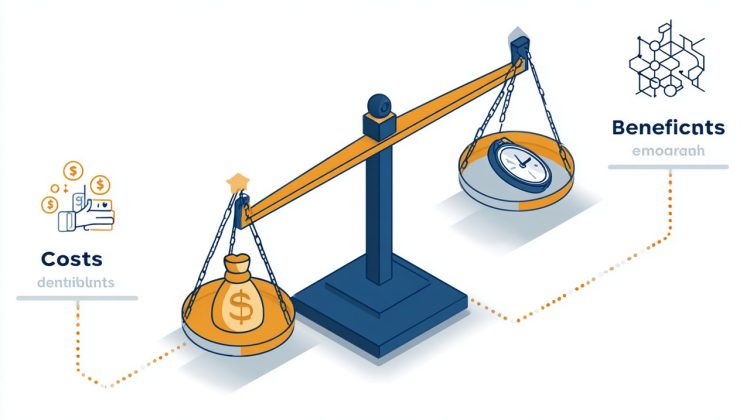Recent analyses suggest a profound re-evaluation of advanced degrees. While a master’s once served as an almost automatic guarantor of a significant competitive edge, the professional landscape of 2025 presents a far more intricate and nuanced reality. We are observing a market where highly specialized skills, frequently cultivated beyond the confines of traditional academic institutions, are increasingly taking precedence. This transformation compels a critical inquiry for any ambitious professional: Is a Master’s Degree Still a Prudent Investment in 2025? This exploration will meticulously examine the empirical data and assess the prevailing performance metrics.

To truly grasp the contemporary relevance of a master’s degree, one must first understand the tectonic shifts occurring within the professional sphere.
The Evolving Landscape of Master’s Degrees in 2025
The professional world in 2025 operates at an unprecedented velocity, a dynamic environment that subjects traditional educational pathways to rigorous scrutiny. The fundamental ‘why’ behind any substantial investment – particularly of time and financial capital – has become paramount. This section offers a comprehensive dissection of the current environment for advanced degrees, revealing the underlying forces at play.
Shifting Tides in Market Demand
Industry demand for specific skill sets has become remarkably fluid, a testament to the rapid pace of innovation and market evolution. Data from LinkedIn’s 2024-2025 job market reports, for instance, underscore a distinct preference for micro-credentials and a demonstrable portfolio of project experience over broad-stroke degrees in several key sectors. While certain regulated professions, such as healthcare and law, rightly maintain stringent educational prerequisites, other domains – notably within technology and the creative industries – now prioritize agility, practical application, and immediate value contribution.
Consider the stark contrast: a software development lead might now place greater value on a candidate’s robust GitHub portfolio and relevant industry certifications than on a generic MBA, reflecting a fundamental reordering of priorities in the hiring process.
The Transformative Impact of Technology
Artificial intelligence (AI) and automation are not merely fashionable terms; they are actively reshaping job functions and redefining the competencies required for success. This relentless technological evolution profoundly influences the perceived value of a master’s degree. Programs that astutely integrate cutting-edge AI literacy, sophisticated data analytics, and robust digital transformation strategies inherently offer a distinct competitive advantage. Conversely, degrees that fail to adapt to these shifts risk a precipitous decline into obsolescence.
It is instructive to view a master’s not as an end in itself, but as a sophisticated tool; its ultimate effectiveness is intrinsically linked to its design, its relevance, and its application within the current, highly dynamic environment.
Economic Return Expectations Reimagined
The initial salary increments for master’s degree holders exhibit considerable variability, contingent upon the chosen field and the prestige of the institution. While a 2023 Georgetown University study indicated a median earnings premium for those with master’s degrees, this aggregate figure can often obscure significant underlying variance. In 2025, the economic return expectations are increasingly and inextricably tied to the specificity of the degree and the reputation of the program within a particular industry ecosystem. Generic degrees, in this new paradigm, may well experience diminishing returns when juxtaposed with highly specialized, in-demand programs.
Understanding the potential for financial uplift, however, is only one side of the ledger. A comprehensive assessment necessitates a rigorous examination of the investment itself.
Investment ROI: A Rigorous Cost-Benefit Analysis
Like any substantial financial undertaking, the pursuit of a master’s degree demands a meticulous cost-benefit analysis. For the discerning individual, this process is fundamentally about quantifying the tangible return on investment (ROI). Scrutinizing the actual capital and time input against the projected output is not merely advisable; it is essential for informed decision-making.

Core Benefits: Cultivating Expertise and Expanding Networks
The advantages of a master’s degree in 2025 extend far beyond the conferral of a simple piece of paper. The structured learning environment, when optimally designed, can provide a multi-faceted platform for growth:
- Deepened Expertise: It facilitates focused, intensive study within a specialized area, often culminating in advanced problem-solving capabilities that are highly prized.
- Enhanced Critical Thinking: The rigorous academic demands inherent in advanced programs serve to sharpen analytical prowess and refine research methodologies.
- Professional Network: Perhaps one of the most enduring assets, it grants unparalleled access to esteemed faculty, influential industry leaders, and a cohort of ambitious, like-minded peers. This carefully cultivated network can prove invaluable for future career trajectories and collaborations.
- Credibility: In specific, often regulated fields, a master’s degree continues to confer a significant level of professional authority and implicit trust, acting as a recognized mark of advanced competence.
At its most potent, a master’s degree functions as both a skill accelerator and a network multiplier, transcending the mere concept of a credential to become a catalyst for profound professional development.
Financial & Time Costs: The Tangible Outlay
The financial outlay required to obtain a master’s degree in 2025 remains substantial, often representing one of the most significant investments an individual will make. This encompasses a range of direct and indirect expenses:
- Tuition and Fees: These can vary dramatically, from tens of thousands to well over six figures for elite programs.
- Living Expenses: A considerable factor, especially for full-time students who may need to relocate, incurring additional housing, food, and transportation costs.
- Lost Income: For many, this represents the most significant opportunity cost. Foregoing 1-2 years of full-time salary can easily total hundreds of thousands of dollars, a figure often underestimated.
- Application Costs: Fees for applications, test preparation courses, and transcript requests, while smaller, add to the cumulative burden.
Consider, for instance, a full-time MBA program: a $150,000 tuition bill, when combined with two years of an $80,000 lost salary, can quickly escalate the total investment to a staggering $310,000. Such a commitment necessitates a meticulously crafted financial plan and rigorously defined expected returns.
Hidden & Opportunity Costs: The Unseen Ledger
Beyond the readily apparent expenses, there exist crucial hidden costs that warrant careful consideration. These include the considerable mental load associated with intense academic study, the potential strain on personal relationships due to time constraints, and the time commitment that inevitably diverts energy from other personal or professional development activities. The opportunity cost of *not* pursuing alternative ventures – such as launching a business, investing in specific, high-value certifications, or accumulating practical, on-the-job experience – must be weighed with equal gravity.
For some, two years of strategic on-the-job experience combined with targeted upskilling might, counter-intuitively, yield a higher ROI than a traditional master’s degree, challenging long-held assumptions about career progression.
This nuanced view of costs and benefits naturally leads to a deeper examination of how a master’s degree truly influences a professional’s trajectory.
Career Trajectory: Unpacking the Master’s Impact
Evaluating a master’s degree as a catalyst for career advancement necessitates a granular examination of its real-world application. It is crucial to recognize that it is not a universal upgrade; its impact is, in fact, highly contextual and deeply interwoven with industry specifics and individual aspirations.
Promotion & Salary Potential: A Differentiated Impact
For a significant number of professionals, the primary impetus for pursuing a master’s is the promise of accelerated career progression and enhanced earning power. Data consistently suggests that in certain fields – such as specialized engineering, finance, or highly technical roles within the tech sector – a master’s degree can indeed serve as a powerful key, unlocking doors to senior positions and higher salary brackets. For example, a data scientist equipped with a master’s in AI/ML might command a 15-20% higher starting salary than a bachelor’s degree holder in a highly competitive market. However, in other fields, demonstrable practical experience, leadership acumen, and a proven track record might exert a more profound influence on promotion prospects.
Specific Industry Value: A Spectrum of Utility
The value proposition of a master’s degree is profoundly dependent on the industry in question, presenting a spectrum of utility:
- High Value: Fields such as Healthcare (e.g., Nurse Practitioner, Physician Assistant), Law, Academia, Research & Development, highly specialized Engineering disciplines, and certain Finance roles consistently show a strong correlation between advanced degrees and career success.
- Contextual Value: In sectors like Technology (where value depends heavily on the specific role and the skills acquired), Marketing, or Human Resources, the utility of a master’s is more nuanced. Here, targeted certifications or intensive bootcamps might often prove to be more efficient and impactful pathways.
- Lower Value: For roles where practical experience, a compelling portfolio, or direct, hands-on contributions are paramount, and the theoretical depth afforded by a master’s doesn’t directly translate into performance gains, its value tends to diminish.
It is within this varied landscape that the rise of alternative pathways becomes particularly noteworthy.
Alternative Pathways: Expanding the Toolkit for Advancement
It is imperative to acknowledge that a master’s degree is by no means the *sole* conduit to career advancement. In 2025, a robust ecosystem of alternatives has emerged, offering diverse and often highly effective routes to professional growth:
- Certifications: Industry-recognized credentials (e.g., Project Management Professional (PMP), AWS Certified Solutions Architect) provide validated proof of specialized skills.
- Bootcamps: Intensive, short-term programs designed to impart specific, in-demand skills (e.g., coding, data science) with a strong focus on practical application.
- Experiential Learning: Actively seeking out challenging projects, assuming leadership roles, or even launching a side hustle can provide invaluable practical skills and demonstrable experience.
- Online Courses & MOOCs: Flexible, often more affordable platforms for acquiring specialized knowledge, allowing for continuous learning without the commitment of a full degree program.
These alternatives can offer a faster, more targeted, and frequently less expensive route to upskilling and career progression, particularly when weighed against the considerable cost and time commitment of obtaining a traditional master’s degree in 2025. The discerning professional must, therefore, approach this decision with a strategic mindset.
Decision Blueprint: Crafting an Optimal Investment Strategy
Ultimately, determining whether a Master’s Degree remains a worthwhile investment in 2025 hinges on individual circumstances, ambitions, and a keen understanding of market dynamics. A precisely articulated decision blueprint can serve as an invaluable guide for your personalized assessment, illuminating the path forward.
Personal Goal Alignment: Clarifying Your ‘Why’
- Career Switch: Is a master’s degree an indispensable prerequisite for pivoting into an entirely new field that demands specific academic credentials?
- Advancement: Is it a non-negotiable requirement for your desired leadership role or a highly specialized technical domain?
- Knowledge Deepening: Are you genuinely driven by an intrinsic passion for a subject, seeking an advanced theoretical understanding that satisfies intellectual curiosity?
- Networking: Is the program’s unique network – its faculty, alumni, and industry connections – a critical and strategic component of your long-term career strategy?
When your goals are lucidly defined and a master’s degree directly and demonstrably addresses them, the case for pursuing it significantly strengthens.
Specialization & Industry Outlook: Foresight as a Compass
Thoroughly research the specific program you are considering and critically assess its alignment with future industry needs and emerging trends. A master’s degree situated within a high-demand, future-proof field – such as cybersecurity, advanced AI, or sustainable energy engineering – will almost certainly yield a higher return on investment. Conversely, pursuing a degree in an oversaturated or declining field represents a considerably riskier proposition. A meticulous analysis of job market trends for your target roles and industries is, therefore, indispensable.
Financial Strategy & Risk: Navigating the Economic Realities
Evaluate your financial readiness and your tolerance for risk with unblinking honesty. Can you comfortably absorb the cost of obtaining a master’s degree in 2025 without jeopardizing your broader financial stability? This assessment should encompass:
- Funding Mechanisms: Explore all avenues, including scholarships, grants, potential employer sponsorship, or personal savings, to mitigate direct out-of-pocket expenses.
- Debt Load Implications: Understand the profound long-term impact of student loans on your future financial freedom and lifestyle choices.
- Return Timeline: Project how long it will realistically take for the anticipated increase in earning potential to fully offset the initial investment.
The ultimate decision regarding a Master’s Degree in 2025 invariably boils down to a highly personalized ROI calculation. It serves as a powerful, transformative tool for some, yet remains a potentially costly detour for others. To render an informed decision, one must undertake a thorough self-assessment of career objectives, conduct exhaustive research into specific program outcomes, and meticulously project the multifaceted financial impact.
Consider leveraging sophisticated tools such as a career ROI calculator or consulting with industry-specific career advisors to model potential earnings and debt repayment scenarios. This data-driven, introspective approach will equip you with the precise insights needed to discern if this significant investment truly aligns with your unique personal and professional growth blueprint, bringing us full circle to the initial question of its enduring worth.
💡 Frequently Asked Questions
The article explores whether a Master's Degree remains a prudent investment in 2025, noting a shift where highly specialized skills and demonstrable portfolios are increasingly prioritized over broad degrees in many sectors.
Industry demand has become fluid, with a distinct preference for micro-credentials and demonstrable project experience over broad degrees in several key sectors. Agility, practical application, and immediate value contribution are prioritized, especially in technology and creative industries.
The costs include substantial tuition and fees, living expenses, significant lost income from not working full-time (which can total hundreds of thousands of dollars), and application costs. There are also hidden costs like mental load and the opportunity cost of not pursuing alternative ventures.
Alternative pathways include industry-recognized certifications (e.g., PMP, AWS Certified Solutions Architect), intensive bootcamps for in-demand skills, experiential learning through challenging projects, and online courses or MOOCs for acquiring specialized knowledge.








